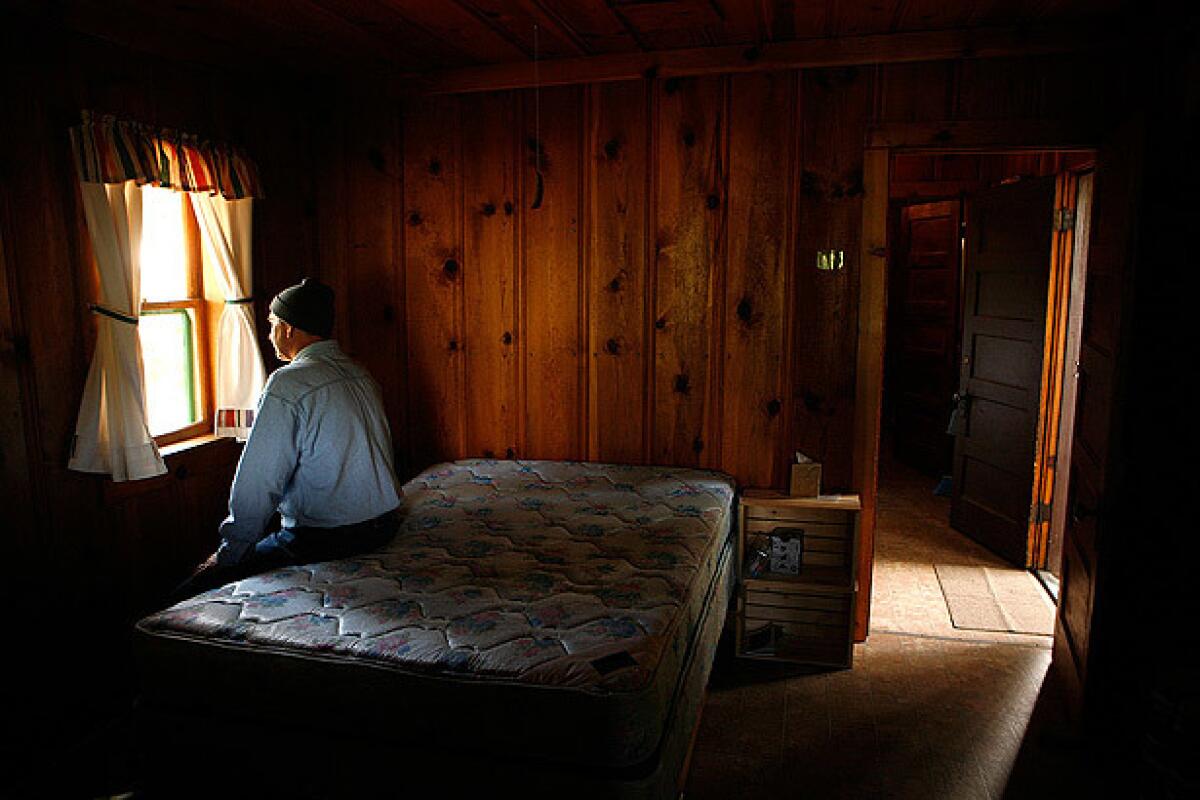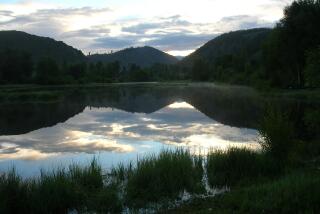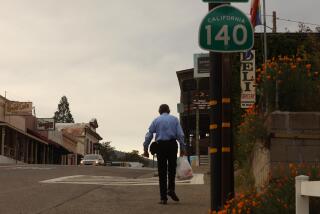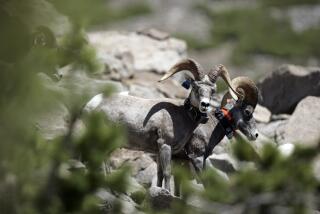An elegy for summertime

The lake is deserted, and the forest is quiet at the far end of Huntington Lodge Road. A breeze combs through the pines and the firs. It strips a ready leaf or two from the willows that grow by the water.
Fall has come to the Sierra Nevada, this third weekend in October, and the cabins on the cul-de-sac are vacant. Most are boarded up for winter, cenotaphs to a time just weeks ago when they were open and alive to the coming and going of vacationing families.
Summer is a short season in the mountains -- over, some say, before it begins -- and for the owners of these cabins, a small resort known as Lakeview Cottages, the clock is running down.
“George, you got any antifreeze?”
“No. It’s down by the shed. You got any screws?”
George Harper and Mark and Cindy Wiens have been working since Friday afternoon, completing chores begun more than a month ago, and now, late Sunday morning, with clouds pouring in from the north, they need to be done.
Cindy walks around a cabin with a power drill, removing screens from the windows. Mark is about to plunge the toilet and pour in a cup of Prestone, and George is looking to fasten a sheet of plywood over a front door.
No one knows what the months ahead will bring, an uncertainty that applies as much to these cabins as to their lives. Saying goodbye, even to a place, is a rehearsal for loss, and these final days have a bittersweet, even melancholy cast.
Sproink. Sproink. Sproink. Sproink.
George staples a piece of black plastic over the hole where the aluminum heater vent once jutted out.
Whizzzzzz.
He screws a small square of plywood over the plastic.
He has been coming to the lake since he was a seventh-grader. He’s 51 now. He met his wife here almost 30 years ago. They practically raised their two daughters on the water. Today he is alone. Sue is back home, fighting a cold and recovering from a stem-cell transplant she received over the summer. The last few months have been tough going.
George and his friends move methodically and steadily, packing up the remaining three cabins, a routine passed down through the years from owner to owner. A staple gun, a cordless power drill, plunger, crescent and pipe wrenches and a Phillips-head screwdriver are all that they need.
Visitors to Lakeview, 12 cabins set on four acres in the Sierra National Forest, arrive the first week of June and book through mid-September. The brief before-and-after is for the owners to enjoy the place while opening and closing it.
The rest of the year, this tiny enclave with its horseshoe pit, stone-lined paths and dirt drive covered with wood chips is deserted. The cabins, green-roofed and redwood-sided, almost 100 years old, are locked up tight, and except for occasional snowmobilers, cross-country skiers and snowshoers, the forest becomes wild again.
Memories recede -- pancake breakfasts, dawn and twilight fishing runs, s’mores and the slam of screen doors as children hurry down to the lake. Now is the time of the wandering deer, perhaps a bear or two.
The pace of work this weekend has hardly been breakneck. Saturday’s perfect weather didn’t help, the warm midday sun a perfect narcotic to draw out idle conversations among a handful of owners who had come up just for the day.
The resort is owned by nine families from the Fresno area, Mennonites, their faith related to the Amish but older and in some instances more liberal. In the mountains, though, their beliefs seem less important than the community they have formed with one another.
The previous owner, living in Southern California, grew tired of the responsibilities and the long drive. When it came on the market, George saw a dream come true. He invited friends out for pizza, presented the idea, and they formed Lakeview Assn. Inc., a corporation and an excuse, any chance to spend more time by the lake they love.
To get a head start on this weekend’s work, George and the Wienses gathered on Friday, and the three friends stayed up late that night, bundled beneath the pines and stars, a fire burning in the stone ring beside the Wienses’ cabin. They reminisced about summer, the guest who set up a screen so they could watch “Cars” outdoors, the Space Shuttle in orbit for four long minutes over the lake.
We were lucky to have purchased Lakeview four years ago, they said, and we’ve done OK in spite of the recession. But George, an attorney who runs a property management firm, doesn’t take anything for granted.
“You know,” he said, “when it comes down to it, life is fragile.”
His words stopped them. Philosophy comes easy in fire-lit moments like this, and George is a thoughtful man. Ask him to explain his attachment to this place, and he will cite E.B. White’s nostalgic essay “Once More to the Lake” -- “Summertime, oh, summertime, pattern of life indelible, the fade-proof lake, the woods unshatterable. . . . “
But tonight, he opened the door to something else, and they knew it. In May, Sue received a diagnosis of multiple myeloma, cancer of the white blood cells. After a summer of chemotherapy and bone marrow replacement, her prognosis is good but guarded.
After the fire burned down, George and Mark wandered behind the cottages, flashlights in hand, to a stony prominence that overlooks the Central Valley. In the distance, fog blurred the lights of Fresno.
“Sue and I once hiked here,” George said, “and I’ll never forget how we saw a six-point buck standing on these rocks. It was like that ad for the insurance company.”
What he didn’t mention was a day last spring when Sue and he had driven to the lake before her treatments began. They were sitting by the water, having lunch and fishing, talking about the future. She told him she wanted her ashes spread up here, and he decided that he wanted the same.
Time in the mountains is often off the clock, measured instead by the angle of the sun or the embers of a fire. Only the fall, more than any other season, hurries everyone along.
After Labor Day, Southern California Edison, which owns the lake, lowers the water level, and the Lakeview docks have to be pulled to flat and sandy ground. The Forest Service marks diseased or rotten trees as hazards; five firs had to be toppled, leaving sections of the trunk behind to be split by the owners.
Just two weeks ago, a snowfall caught them by surprise, dime-size flakes drifting out of the sky on a Sunday morning, the lake passing in and out of view, the island and the distant peaks taking on an ethereal cast.
The cold made it impossible for George and the other owners who joined him that weekend to finish winterizing their fishing skiffs’ outboard motors. They had six to do, but they could only get to three, their fingers too numb to continue.
Spring is always the revelation, a cabin collapsed by the crush of snow or a falling tree, the grounds eroded by a rainfall. Nothing like that has happened so far, though one year neighbors down the road returned after winter to discover that their cabin had been broken into by vandals who burned cabinets for warmth and then left the doors open for the bears to get in and set up shop.
Hence, the precautions and a 38-point checklist. One item overlooked, and in seven months the owners might arrive to find critters nesting in mattresses or dead in the toilet, pipes frozen and cracked and water warping the linoleum floors.
By midafternoon Sunday, George is working alone in his cabin. The strains of a guitar, a rendition of the hymn “Veni, Sancte Spiritus,” play on his iPod. After packing dishes and storing the bedding, he steps outside and sets a small fire in the ring next to the cabin.
That morning, at first light, he and Mark got lucky at the lake. The wind was down. Sunlight hit the far bank, shouldering aside the pallid dawn, and aspens across the water shimmered brightly. Mark, 58, who works as a kitchen designer and has a boyish shout that, he brags, can echo off seven surrounding hills, built a fire and tended the flames.
George noticed the tip of his rod twitching. He hurried to pick it up, gingerly held it in his hand and then jerked it back. He had a rainbow on the end. Soon they landed three trout, each almost 13 inches long. Hiking up from the lake, tackle boxes, rods and stringer in hand, the two men looked like little boys who knew their time was running out.
“We’re getting close to being the last ones at the lake,” George said.
“We sure are.”
Nearly a century ago, this side of Huntington was the center of lake’s social life. From here the construction of three dams -- Henry Huntington’s ambition to bring electricity to Los Angeles and his electric railway -- was managed, and afterward, two grand hotels anchored the site. One burned, and the other was a casualty of the Depression.
What once was imagined and built and romanced now lies mostly buried by the woods or exposed by the diminished lake. Tree stumps and boulders stand among a succession of wrack lines, a moonscape littered with seasonal debris. Not far away, just off the road, lie lost relics, like memento mori, of another era: a tennis court cracked by errant pines, a fish pond filled with duff.
On top of the fire, George places the grill covered with a sheet of foil. He lays out the trout and lets them cook, occasionally turning them over. Mark and Cindy stroll over and join him for lunch. Keola Beamer’s slack key styling replaces the hymn. “It’s not easy to leave again,” the Hawaiian sings as long shadows etch patterns of light against the weathered wood of the cabins.
After cleaning up -- a shovel of dirt smothering the coals -- the fire ring is deserted, the chairs taken in. Now the task of finishing up.
“Water valve off.” Check.
“Gas off at regulator.” Check.
“Power off.” Check.
The cabins grow cold and dark as shutters wrap windows and decks. Sunlight slants through the pencil-thin cracks of each new sepulcher. A breeze kicks up, and the pines and firs begin their soft, uneasy roar.
Afterward, the three climb the hill above the cabins where a wooden box lies buried in needles. George gets down on one knee, opens the hinged lid and turns counterclockwise the green valve that brings water to the cottages. Draining the pipes that connect the cabins is the final task.
Pop. Pop. Pop.
A hunter’s rifle echoes in the distance.
By late afternoon, taillights glow as George and his friends head down the road. Lakeview Cottages is a ghost town, home now to the jays and chipmunks that pick up where the humans left off.
Out on the lake, two trout break the surface, their ripples soon disappearing to nothing.
More to Read
Start your day right
Sign up for Essential California for news, features and recommendations from the L.A. Times and beyond in your inbox six days a week.
You may occasionally receive promotional content from the Los Angeles Times.







